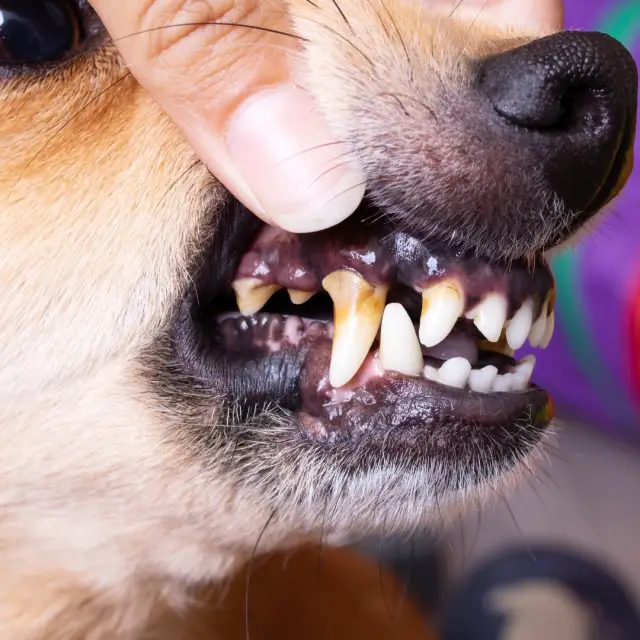Tartar, also known as dental calculus, is a buildup of hardened plaque on dogs' teeth. It is a common problem that, if not treated properly, can lead to serious dental diseases.
What is Tartar?
Tartar is a hardened form of dental plaque. Plaque is a sticky film composed of bacteria and food debris that forms on dogs' teeth. If not removed, plaque can mineralize over time and turn into tartar, a hard, brown or yellowish substance.
Causes of Tartar in Dogs
Tartar forms when dental plaque is not removed regularly. The main causes include:
Lack of Dental Hygiene : Insufficient dental cleaning allows plaque to accumulate and turn into tartar.
Diet: Soft, moist foods can stick more easily to the teeth, promoting plaque formation.
Genetics : Some breeds are more prone to dental problems due to the shape of their jaws and teeth.
Age : Older dogs tend to have more tartar problems due to buildup over time.
Saliva Production: Saliva helps eliminate food debris and bacteria from the mouth. Dogs with less saliva production may have more tartar problems.
Symptoms of Tartar in Dogs
Identifying the symptoms of tartar in dogs is crucial to addressing the problem in time. Common signs include:
Bad Breath: One of the first signs of tartar is bad breath (halitosis).
Red and Swollen Gums: Tartar buildup can irritate the gums, causing redness and inflammation.
Difficulty Eating: Dogs with severe tartar may experience pain when chewing.
Tooth Loss: In advanced cases, tartar can cause tooth loss due to damage to the gums and underlying bone.
Excess Salivation: Some dogs may drool more than normal if they have dental problems.
How to Prevent Tartar in Dogs
Preventing tartar formation is essential for your dog's dental health. Here are some effective strategies:
Regular Tooth Brushing: Brushing your dog's teeth daily is the best way to prevent tartar. Use a toothbrush and toothpaste designed specifically for dogs.
Dental Toys and Treats: These products are designed to help remove plaque and massage the gums while your dog chews.
Dry Foods: Dry foods can help scrape plaque from your teeth, unlike wet foods that can stick.
Mouthwashes for Dogs: There are mouthwashes specially formulated for dogs that can help reduce bacteria in the mouth.
Regular Visits to the Veterinarian: Regular dental checkups allow dental problems to be detected and treated before they become serious.
Tartar Treatment in Dogs
If your dog already has tartar, it is important to treat it to avoid further complications. Here are the most common treatment methods:
Professional Dental Cleaning
The most effective way to remove tartar is through a professional dental cleaning performed by a veterinarian. This procedure usually includes:
Pre-Exam: The veterinarian will perform a complete exam to evaluate your dog's dental health and determine the need for cleaning.
Anesthesia : Professional dental cleaning is performed under general anesthesia to ensure that the dog is comfortable and the veterinarian can work safely and effectively.
Scaling and Polishing: The veterinarian will use specialized instruments to remove tartar from the teeth and under the gums. The teeth are then polished to remove any roughness where plaque can easily adhere.
Dental X-rays : In some cases, x-rays may be taken to evaluate the health of the teeth and roots.
Additional Treatment: If there are signs of periodontal disease or infection, your veterinarian may recommend additional treatments, such as antibiotics or dental extractions.
Home Remedies and Natural Treatments
In addition to professional cleaning, there are several home remedies and natural treatments that can help reduce tartar in dogs:
Tooth Brushing at Home: Continuing with regular brushing at home is crucial to maintaining dental hygiene after a professional cleaning.
Coconut Oil: Coconut oil has antibacterial properties and can be used to brush your dog's teeth or added to their food to improve oral health.
Apple Cider Vinegar: Adding a small amount of apple cider vinegar to your dog's water can help reduce bacteria in the mouth.
Raw Foods and Bones: Raw bones and certain raw foods can help clean teeth naturally as the dog chews.
Natural Dental Gel: There are natural dental gels that contain ingredients such as chlorophyll and aloe vera, which can help keep teeth and gums healthy.
Post-Treatment Care
After a professional dental cleaning, it is important to follow a dental care routine to prevent tartar from reappearing. Here are some tips:
Regular Brushing: Continue to brush your dog's teeth at least three times a week, preferably every day.
Healthy Diet: Provide a balanced diet that includes dry and crunchy foods to help clean teeth.
Regular Checkups: Schedule regular dental checkups with your veterinarian to monitor your dog's oral health.
Dental Toys: Provides safe and effective dental toys to keep teeth clean and gums healthy.
Dental Products : Consider using additional dental products, such as mouthwashes and gels, to maintain oral hygiene.
Importance of Dental Health in Dogs
Maintaining good dental health is vital not only for your dog's mouth, but for his overall well-being. Dental problems can lead to:
Pain and Discomfort: Sore teeth and gums can affect your dog's appetite and behavior.
Infections: Bacteria in the mouth can cause infections that can spread to other organs, such as the heart and kidneys.
Tooth Loss: Tartar and periodontal disease can lead to tooth loss, affecting your dog's ability to eat properly.
Systemic Problems: Untreated dental disease can contribute to systemic problems that affect your dog's overall health.
Tartar in dogs is a common problem but manageable with proper care and attention. Through regular prevention, such as brushing teeth, using dental toys and treats, and regular visits to the vet, you can keep your dog's dental health in optimal condition. If your dog already has tartar, a professional dental cleaning followed by diligent maintenance can help prevent future problems. Your dog's dental health is an essential part of his overall well-being, and by keeping his teeth clean and healthy, you ensure a longer, healthier life for your faithful companion.
